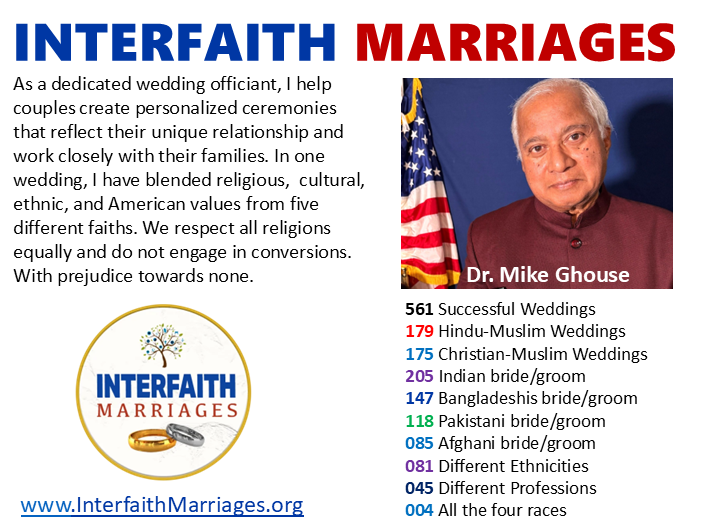As a Muslim, I find guidance in both the Quran and the Bhagavad Gita. These texts teach me how to live peacefully with myself and those around me, including fellow humans, animals, and the entire universe. Our peace comes from removing biases towards others by taking the time to understand them.

In the Quran, God states that He could have created all of humanity to be identical, but He chose to make us unique individuals. Each person has a distinct fingerprint, eye print, taste buds, and DNA, highlighting our exceptional uniqueness.
Additionally, God has placed us in different communities, tribes, nations, and, by extension, various ethnicities, races, and religions.
According to the Quran, the best among us are those who take the time to learn about one another, resulting in peace, security, and harmony in the creation.
Let’s ask a few questions about Hinduism
Do Hindus reject the existence of God?
Not at all.
I know of no Hindu who rejects the existence of God.
Is Allah a God of Muslims?
Not at all.
Allah is the name of the ‘creator ’ of all the universe. Allah is not a being or a thing; He is not the property of Muslims or any group. It is simply a name for the energy or the Noor that caused the universe and everything in it. Let me put it this way, Allah is the common causer of all creation. The Quran says he is the God of the universe (1:2) – the God of 8 billion people.
Does Allah have many names, or limited to one?
Indeed, Allah has many names.
Muslim scholars have pulled 99 words out of the Quran representing each attribute and called it Asma-e-Husna. The number 99 means unlimited. The Hindus have Sahasranama, a thousand names; again, a thousand here represent infinite.
Do Hindus believe in one ultimate God?
Yes, they do.
From the Quran: Sura Ikhlas
The Quran explicitly declares God’s oneness and uniqueness in Surah Ikhlas (112:1-4):
Arabic Text:
قُلْ هُوَ اللَّهُ أَحَدٌ
اللَّهُ الصَّمَدُ
لَمْ يَلِدْ وَلَمْ يُولَدْ
وَلَمْ يَكُن لَّهُ كُفُوًا أَحَدٌ
Translation:
- “Say: He is Allah, the One and Only;
- Allah, the Eternal, Absolute;
- He begets not, nor is He begotten;
- And there is none like unto Him.”
From the Vedas: Core Teachings on God’s Oneness
The Vedas emphasize God’s oneness and formlessness:
- Chandogya Upanishad 6:2:1
Sanskrit: एकं एव अद्वितीयं
Transliteration: Ekam evadvitiyam
Translation: “He is One only, without a second.” - Svetasvatara Upanishad 6:9
Sanskrit: न तस्य कश्चिज जन्मिता न चाधिपः
Transliteration: Na casya kascij janita na cadhipah
Translation: “Of Him there are neither parents nor lord.” - Svetasvatara Upanishad 4:19
Sanskrit: न तस्य प्रतिमा अस्ति
Transliteration: Na tasya pratima asti
Translation: “There is no image of Him.” - Svetasvatara Upanishad 4:20
Sanskrit: न सम्द्र्शे तिष्ठति रूपमस्य, न चक्षुसा पश्यति कश्चनैनम
Transliteration: Na samdrse tisthati rupam asya, na caksusa pasyati kas canainam
Translation: “His form can’t be seen; no one can see Him with the body’s eyes.” - Yajurveda 40:8
Sanskrit: शुद्धामापापविधं
Transliteration: Shudhama poapvidham
Translation: “He is bodiless and pure.”
What are the most recited verse in Hinduism and Islam?
From the Quran: Sura Fatiha
The first and most recited chapter of the Quran emphasizes devotion to God:
Arabic Text:
بِسْمِ ٱللَّهِ ٱلرَّحْمَـٰنِ ٱلرَّحِيمِ
ٱلْحَمْدُ لِلَّهِ رَبِّ ٱلْعَـٰلَمِينَ
ٱلرَّحْمَـٰنِ ٱلرَّحِيمِ
مَـٰلِكِ يَوْمِ ٱلدِّينِ
إِيَّاكَ نَعْبُدُ وَإِيَّاكَ نَسْتَعِينُ
ٱهْدِنَا ٱلصِّرَٰطَ ٱلْمُسْتَقِيمَ
صِرَٰطَ ٱلَّذِينَ أَنْعَمْتَ عَلَيْهِمْ غَيْرِ ٱلْمَغْضُوبِ عَلَيْهِمْ وَلَا ٱلضَّآلِّينَ
Translation:
- “In the name of God, The Most Gracious, The Most Merciful
- All praise is due to God, the Lord of the worlds,
- Master of the Day of Judgment,
- You alone we worship, and You alone we ask for help.
- Guide us to the right path.
- The path of those upon whom You have bestowed Your blessings, not those who went astray.”
From the Gayatri Mantra: Hinduism’s Sacred Verse
The Gayatri Mantra is the most recited verse by Hindus:
Sanskrit Text:
ॐ भूर्भुवः स्वः
तत्सवितुर्वरेण्यम्
भर्गो देवस्य धीमहि
धियो यो नः प्रचोदयात् ॥
Transliteration:
Om bhur bhuvah svah
Tat savitur varenyam
Bhargo devasya dhimahi
Dhiyo yonah prachodayat
Translation:
- “We meditate on the glory of the Creator;
- Who has created the universe;
- Who is worthy of worship;
- Who is the embodiment of knowledge and light;
- Who is the remover of all sin and ignorance;
- May He enlighten our intellect.”
Do Hindus believe in multiple Gods?
Not at all.
Hindus believe in Asma-e-Husna, different attributes of the same God. The creator, sustainer, and recycler are the main attributes and many more representations.
Do Hindus believe in accountability for their actions?
Yes, they do.
The law of Karma works its way. When one is free from harmful actions to fellow beings, they are liberated from the cycle of birth or the pangs of conscience and receive Moksha, freedom, liberation, salvation, Mukti, Nijaat, etc. Moksha is the state of mind or soul without tensions, hassles, apprehensions, fears, and anxieties, and it is free from all that, and that is what Paradise or Jannat is.
What do Muslims have in terms of accountability?
Muslims are to account for their actions on the Day of Judgement, and if they have done more good Karma, they will be liberated and get a pass to paradise. And what is heaven? Do you see anything different than Moksha?
The bottom line is the same for Muslims and Hindus–freedom!
Atheists and Agnostics may not believe in God, but accountability is the function of living amidst others. Whether a Muslim, Hindu, Christian, or an Atheist, if he rapes, kills, or steals – he will get the same punishment from civil society.
Are Hindus Kafir?
Historically, Kafirs were the specific group of people from among the Meccans who harassed, chased, and persecuted the believers. They were some of the Meccans and not all of them.
Shamefully, the term Kafir was used as a derogatory term and should not be acceptable in any civil society. Hindus are not Kafirs. Many Muslim scholars in India have written about it, including your friend, and the World’s largest Islamic organization Nahdatul Ulama has also declared that the word Kafir should not be used as a derogatory term.
When you hear the phrase “Surrender to God,” It simply means subscribing to the rules for creating cohesive societies where everyone can live in harmony and without fear. After all, everything in nature runs precisely, whether it is the sun, or the tilts of the earth, to give seasons and sustain life. There is a system created by every religion to create safe societies.
The purpose of religion is to create cohesive societies where all of God’s creations can live securely and in harmony regardless of their race, belief, culture, ethnicity, or any other uniqueness. God created everything in balance, and he expects us to sustain that.
Our words and actions should respect and accept the otherness of others. Live and let live. What is our loss if someone worships God differently than you? Really, what is your loss?
Hindus are not Kafirs, and let’s consciously remove the abuse of the word to use it derogatively. We are all from Adam and Eve, or we are all part of the Vasudhaiva Kutumbukum. We are all part of the same family and the same creator.
# # #
The term kafir comes from an Arabic root meaning “to cover” or “to conceal,” and it is used in Islamic theology to describe one who denies or rejects divine truth. However, its public use to label citizens in a diverse country like Indonesia can be deeply derogatory and harmful. NU’s declaration seeks to replace this hurtful use with the more inclusive language of “citizen” in the context of the modern nation-state.
Imam Ali once said: ‘People are of two kinds: either your brothers in faith or your equals in humanity.’ These timeless words teach us that.
Hindus do not deny the divine truth, they believe in God, someone who caused the universe to come into being and created the systems to sustain.
The Hindus are wrongly called Kafir. It’s time to correct the wrong.
Fatwa by Nahdlatul Ulama (NU)
In 2019, Indonesia’s largest Muslim organization, Nahdlatul Ulama (NU), issued a formal recommendation for Muslims to stop using the term “kafir” (infidel) when referring to non-Muslims, including Hindus. Instead, NU urged using the term muwathinun, or “citizens,” to promote equality and harmony in a diverse nation. This is a key event in a broader Indonesian context of respect for its Hindu heritage and official recognition of the religion.
The significance of NU’s declaration
- Contextualizes the term kafir: NU’s clerics explained that the traditional theological meaning of kafir described those who rejected Islam during the time of the Prophet in Mecca. The term does not apply in a modern, pluralistic society where citizens of different faiths share equal rights.
- Reinforces equal citizenship: By promoting the term muwathinun (citizens), NU sought to strengthen the principle that non-Muslims have the same rights and obligations as Muslim Indonesians.
- Influences broader religious discourse: The recommendation from NU, with its massive membership, encouraged a more tolerant vocabulary and signaled a rejection of exclusionary, rigid interpretations of Islam in favor of moderation.
Hinduism’s official status in Indonesia
- Recognized national religion: Indonesia officially recognizes Hinduism as one of its six national religions, along with Islam, Catholicism, Protestantism, Buddhism, and Confucianism.
- Prominent in Balinese culture: The majority of Indonesian Hindus live on the island of Bali, where the religion and its customs are a cornerstone of the local culture.
- Deep historical roots: Even among Indonesia’s Muslim-majority population, there is respect for the nation’s pre-Islamic Hindu and Buddhist history. This is evident in cultural practices and symbols, such as depictions of Hindu deities on some of the country’s early currency.
Hindus Are Not the Kafirs
Abstracts from the article:
The root verb of Kafir, and of the infinitive noun kufr, is the trilateral K-F-R (kafara), which means, “he covered (a thing)”. Originally, it described farmers burying seeds in the ground. In surah 57, verse 20, the Quran uses the word Kafir for a farmer as he covers the sown seed with earth. The Quran depicts how Fir ’awn fulminated against Moosa for challenging his authority, called him a Kafir, an ingrate, for the latter was brought up in his own royal household (surah 26, verse 18-19).
No verse of the Quran describes a mere non-Muslim as Kafir. One doesn’t become a Kafir by default for not belonging to the Muslim community. What does make one is the persecution and oppression of Muslims; attempt to stop them from practising their religion; driving them out of their homes; and waging war against them (2:190, 217; 47:1). Hindus never stopped Muslims from practising their religion or drove them from their homes and made them refugees, or waged religious war against them. So, how do they become a Kafir?
The Quran does not use the word Kafir for a whole community and so the use of the word Kafir for the entire Hindu community is not correct. Even a Muslim is said to have committed Kufr when he violates an important injunction of the Quran. In support of his arguments, the author quotes some verses from the Quran and suggests that the use of the word Kafir for the Indian Hindus should be stopped in order to build bridges between the two communities. https://www.newageislam.com/interfaith-dialogue/ibn-khaldun-bharati-new-age-islam/hindus-kafirs-mentioned-quran/d/128100
Indonesia’s largest Islamic group says non-Muslims shouldn’t be called ‘kafir’
https://www.freemalaysiatoday.com/category/highlight/2019/03/03/indonesias-largest-islamic-group-says-non-muslims-shouldnt-be-called-kafir
Hindus are not Kaffirs
https://www.thehindu.com/opinion/op-ed/hindus-are-not-kafirs-muslims-are-not-jihadis/article66026722.ece
Reflections on who are People of the book?
https://interfaithmarriages.org/understanding-the-people-of-the-book/
Understanding the verse 2:221
https://interfaithmarriages.org/understanding-the-verse-2221-of-quran-sura-baqarah/
Can a Muslim Woman Marry a Non-Muslim?
https://interfaithmarriages.org/can-a-muslim-woman-marry-a-non-muslim/
Essence of Hinduism
https://interfaithmarriages.org/hinduism-in-250-words-understanding-its-essence/
Is Hinduism a monotheistic religion?
https://interfaithmarriages.org/is-hinduism-a-monotheistic-religion-a-deep-dive-into-beliefs-and-misconceptions/
Who is a Muslim and What is Islam?
https://interfaithmarriages.org/who-is-a-muslim-and-what-is-islam/
Muslim Background of Mike Ghouse
https://interfaithmarriages.org/muslim-background-of-dr-mike-mohamed-ghouse/
Dr. Ghouse is the President and founder of the Center for Pluralism and director of the World Muslim Congress. He is an Interfaith Wedding Officiant for InterfaithMarriages.org and a Muslim Wedding Officiant. He is a Muslim, Pluralist, activist, speaker, author, and social scientist. More on Google


